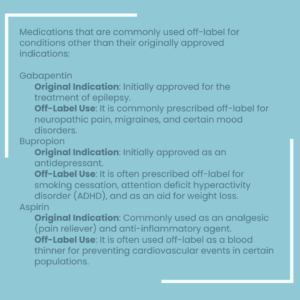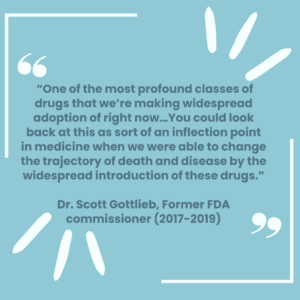Obesity is a Disease
At least that’s what the American Medical Association finally recognized in 2013. And considering there are over one billion people globally living with obesity, it’s about time. In the US obesity affects 40% of adults and 20% of children.

Research into weight loss medicines has been going on since the 1970’s and the study of GLP-1 Agonists started in the 1990’s. When Semaglutide was first made in 2004, the weight loss benefits from this medication created to treat diabetes could not be ignored.
Semaglutide is a Glucagon Like Peptide Receptor Agonist (GLP1-RA). It mimics naturally occurring hormones in the body called GLP-1.
GLP-1 Regulates insulin and glucose for blood sugar, it helps the stomach feel full faster and longer. It also affects appetite centers in the brain so that people have less of a drive to eat.
It has been known to help with food noise, a little bug in your ear constantly asking you when it’s the next time to eat. You can read all about the benefits of Semaglutide here.
“The main effect on weight loss is on the brain.” – Professor Jens Juul Holst, University of Copenhagen. One of the scientists that discovered GLP-1 and has been studying GLP-1 Agonists since the ‘90s.
Years in the Making
Novo Nordisk has been a leader in the anti-obesity drug industry for years, along with Eli Lilly which has it’s own GLP-1 RA called Tirzepatide.
Novo Nordisk has been around since 1923. It’s main focus was making injectable insulin for diabetes and it was considered a small company in relative terms. In 2004 semaglutide was first made in Novo Nordisk by Lab Technician, Pau Bloch and the company will never be the same. In Jan 2024 Novo Nordisk was valued at more than 500 billion dollars. More than Walmart. Novo Nordisc is investing billions in this industry.
For years both pharmaceutical companies have been competing in this market that is slated to be worth more than 100 billion dollars by 2030.

Novo Nordisk GLP-1 RA Semaglutide is released in the following brand names:
- 2015 first weight loss drug is released called Saxenda
- 2018 diabetes drug Ozempic – used off label for weight loss
- 2019 diabetes drug Rybelsus – used off label for weight loss
- 2021 Wegovy for weight loss
Eli Lilly GLP-1 RA Tirzepatide is released in the following brand names:
- 2022 diabetes drug Mounjaro – used off label for weight loss
- 2023 Zepbound for weight loss
The practice of using a medication to treat a condition other than its original intended purpose is known as “off-label” use.
Game Changer
Data shows the benefits go beyond weight to diseases associated with obesity:
- Hypertension
- Diabetes
- High blood pressure
- High cholesterol
Weight loss data from Novo Nordisk on Wegovy shows a reduction in cardiovascular risks. And a dramatic reduction in the risk of a secondary cardiovascular event (heart attack and strokes) in patients that have already suffered an event.

This drug is also being looked at to treat other diseases. There are studies being done to research the following potential treatments:
- Addictions
- Polycystic Ovarian Syndrome
- Renal disease
- Sleep apnea
- Alzheimer’s
- Kidney disease
- Liver disease
This year will be critical in terms of data read out for other use cases like Liver disease, Kidney disease, Sleep Apnea, and Alzheimer’s trials have just started.
“There is a possibility that this drug affects the centers of the brain that have to do with addiction. It can extend itself into Alcohol use disorder.” – Dr. Virginia Chang, Assoc. Professor of NYU School of Global Public Health
Things to Consider
With such promising hope there is now focus on what the medical impact on health conditions will be when using these drugs long term. The use of these at a higher dosage is being considered for predictable manageable effects. There’s also the concern for supply and demand affecting diabetes patients.
The availability of this drug for children is being considered as well. Given that 20% of children in the US suffer from obesity Pediatrics agencies are finding it difficult to justify not offering it as an option to children when comparing the risks associated to obesity.
Parents that have had to choose surgery for their children because that was the only option available say they would have tried this medication first if they had the chance.
Financial access is also a consideration as this medicine becomes main stream. Right now the name brand medications Ozempic and Munjaro run about $1K to $1.5K a month. And they’re recommending patients take them potentially for the rest of their life. Alternative compounded versions are becoming available at more affordable prices but they have their own challenges.

Compounded Semaglutide
Some compounding pharmacies are now offering compounded Semaglutide. Compounding is defined as custom making medications to tailor a medication for a customer need. Such as making a pill form of a medication that is usually delivered in liquid form.
When a medication is on a shortage it is allowed to be compounded. Semaglutide is in that category. This is why there are a variety of alternatives to the name brand versions of semaglutide. The benefit is that the cost is lower. There is a concern with the purity of the molecule used to compound the semaglutide. Some pharmacies also add B-12 to their mix. So you may not be getting the pure Semaglutide compound. Choosing the right pharmacy is vital. Purity of molecules is vital.
The Future is Here
Regardless of the concerns that some may have this is a game changing drug. The signs can be seen in the stock market valuation and early reactions. You saw market cap shifts from clothing and fast food companies to the two pharmaceutical companies Eli Lillly and Novo Nordisk. Stocks got re-rated as they kept going up in price.
Investors are thinking about this as a game changer, not just an investing trend. When you dig down into the potential use cases in sleep apnea, renal disease, addictions, Alzheimer’s, this is not just something that will impact the investment world but potentially could have profound impacts on society.
Another sign that this is here to stay is that Weight Watchers bought a tele-health service company and is entering the market.
The following quote should put this drug and it’s potential into context:
“One of the most profound classes of drugs that we’re making widespread adoption of right now…You could look back at this as sort of an inflection point in medicine when we were able to change the trajectory of death and disease by the widespread introduction of these drugs.” – Dr. Scott Gottlieb, Former FDA Commissioner (2017-2019)